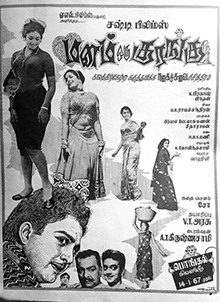Manam Oru Kurangu
| Manam Oru Kurangu | |
|---|---|
 Theatrical release poster | |
| Directed by | A. T. Krishnaswamy |
| Screenplay by | Cho Ramaswamy |
| Based on | Pygmalion by George Bernard Shaw |
| Produced by | T. V. Arasu |
| Starring | Cho Ramaswamy R. Muthuraman T. S. Balaiah A. V. M. Rajan K. R. Vijaya Vijayarani |
| Music by | D. B. Ramachandran |
Production company | Sashti Films |
Release date |
|
| Country | India |
| Language | Tamil |
Manam Oru Kurangu (transl. The heart is a monkey) is a 1967 Indian Tamil-language satirical film directed by A. T. Krishnaswamy and produced by T. V. Arasu. Based on the play of the same name, itself inspired by the 1913 George Bernard Shaw play Pygmalion, the film stars Cho Ramaswamy (who also wrote the screenplay), R. Muthuraman, T. S. Balaiah, A. V. M. Rajan, K. R. Vijaya and Vijayarani. It was released on 14 January 1967 and became a commercial success.
Plot[]
Maruthayi is a village-based vegetable seller who, by sheer accident, becomes an actress named Mallika Devi. Murgesa, a farmer from the same village, loves Maruthayi and wants to marry her, but after she becomes an actress, she moves away from him. It was Gopinath, a wealthy socialite, who made her an actress as he laid a challenge that he would transform a vegetable seller into an actor if his regular heroine exited at the last second. A rich man's son Chellappa aspires to marry Maruthayi, but ends up marrying another girl. Murgesa realises that Maruthayi has a new status; when he tries to meet her, Gopinath discourages him, and he returns to his village. When Gopinath confesses his love for Maruthayi, she does not reciprocate. She is left alone, with nowhere to go.
Cast[]
- Cho Ramaswamy as Chellappa[1]
- R. Muthuraman as Murugesa[2][3]
- T. S. Balaiah as Chellappa's father[2]
- A. V. M. Rajan as Gopinath[2]
- K. R. Vijaya as Maruthayi / Mallika Devi[1][2]
- Vijayarani as Chellappa's wife[2]
Production[]
Manam Oru Kurangu was a play written by Cho Ramaswamy and inspired by the George Bernard Shaw play Pygmalion. It was originally announced as Dil Ek Bandhar, a pun on the title Dil Ek Mandir.[2][4] The play Manam Oru Kurangu, which also starred Delhi Ganesh,[5] was later adapted into a feature film with the same name directed by A. T. Krishnaswamy and produced by T. V. Arasu under Sashti Films. Cho was part of the cast and also wrote the screenplay.[2][6] M. P. Viswanathan worked as an assistant make-up artist.[7]
Themes[]
The film exposes the snobbish values dominating society in everyday life.[8]
Soundtrack[]
The soundtrack was composed by D. B. Ramachandran.[9] The title song, performed by T. M. Soundararajan, became the film's most popular song.[2][10]
| No. | Title | Singer(s) | Length |
|---|---|---|---|
| 1. | "Aruppu Kotta Machchan" | L. R. Eswari | 3:24 |
| 2. | "Beautiful" | Sirkazhi Govindarajan, L. R. Eswari | 3:05 |
| 3. | "Manam Oru Kurangu" | T. M. Soundararajan | 3:17 |
| 4. | "Pattanathu Santhaiyile Koodaikari" | Soolamangalam Rajalakshmi |
Release and reception[]
Manam Oru Kurangu was released on 14 January 1967,[6] during the festive occasion of Pongal.[11][12] Despite facing competition from other Pongal releases such as Kandhan Karunai, Pattathu Rani and Penne Nee Vazhga,[11] the film emerged a commercial success.[2]
References[]
- ^ a b Vamanan (24 December 2016). "கலைமாமணி வாமனனின் 'நிழலல்ல நிஜம்' – 56 | திரை வடிவம் பெற்ற சோவின் மேடை நாடகங்கள்!". Dinamalar. Nellai. Archived from the original on 19 December 2018. Retrieved 19 December 2018.
- ^ a b c d e f g h i Guy, Randor (25 December 2016). "Manam Oru Kurangu (1967) TAMIL". The Hindu. Archived from the original on 19 December 2018. Retrieved 19 December 2018.
- ^ Pandian, Anand (2009). Crooked Stalks: Cultivating Virtue in South India. Duke University Press. pp. 132–133. ISBN 978-0-8223-9101-2.
- ^ Venkatachalapathy, AR (11 December 2016). "Cho Ramaswamy articulated the anxieties of conservative, middle-class Brahmins". The Economic Times. Archived from the original on 3 March 2019. Retrieved 3 March 2019.
- ^ "ராகவேந்திரா படத்தில் நடித்ததன் மூலம் எனக்கு நல்ல வரவேற்பு கிடைத்தது: நடிகர் டெல்லி கணேஷ் பேட்டி". Maalai Malar (in Tamil). 26 August 2016. Archived from the original on 3 March 2019. Retrieved 3 March 2019.
- ^ a b Film News Anandan (2004). Sadhanaigal Padaitha Thamizh Thiraipada Varalaru [Tamil film history and its achievements] (in Tamil). Chennai: Sivagami Publishers. Archived from the original on 19 December 2018. Retrieved 19 December 2018.
- ^ "He would reach studio at 7am with a bowl of porridge". The Times of India. 8 December 2016. Archived from the original on 3 March 2019. Retrieved 3 March 2019.
- ^ Ramanujam, K. S. (1971). Challenge and Response: An Intimate Report of Tamil Nadu Politics, 1967–1971. Sundara Prachuralayam. p. 161.
- ^ "Manam Oru Kurangu (Original Motion Picture Soundtrack)". iTunes. Archived from the original on 19 December 2018. Retrieved 19 December 2018.
- ^ Velayutham, Selvaraj (2008). Tamil Cinema: The Cultural Politics of India's Other Film Industry. Routledge. p. 129. ISBN 978-1-134-15446-3.
- ^ a b "சாண்டோ சின்னப்பா தேவர்! (16)". Dinamalar (in Tamil). 22 November 2015. Archived from the original on 19 December 2018. Retrieved 19 December 2018.
- ^ "மனம் ஒரு குரங்கு". Kalki (in Tamil). 5 February 1967. p. 17. Archived from the original on 17 September 2021. Retrieved 17 September 2021.
External links[]
- 1967 films
- Tamil-language films
- 1960s satirical films
- 1960s Tamil-language films
- 1967 comedy films
- Films about actors
- Films based on adaptations
- Indian comedy films
- Indian films based on plays
- Indian films
- Indian satirical films
